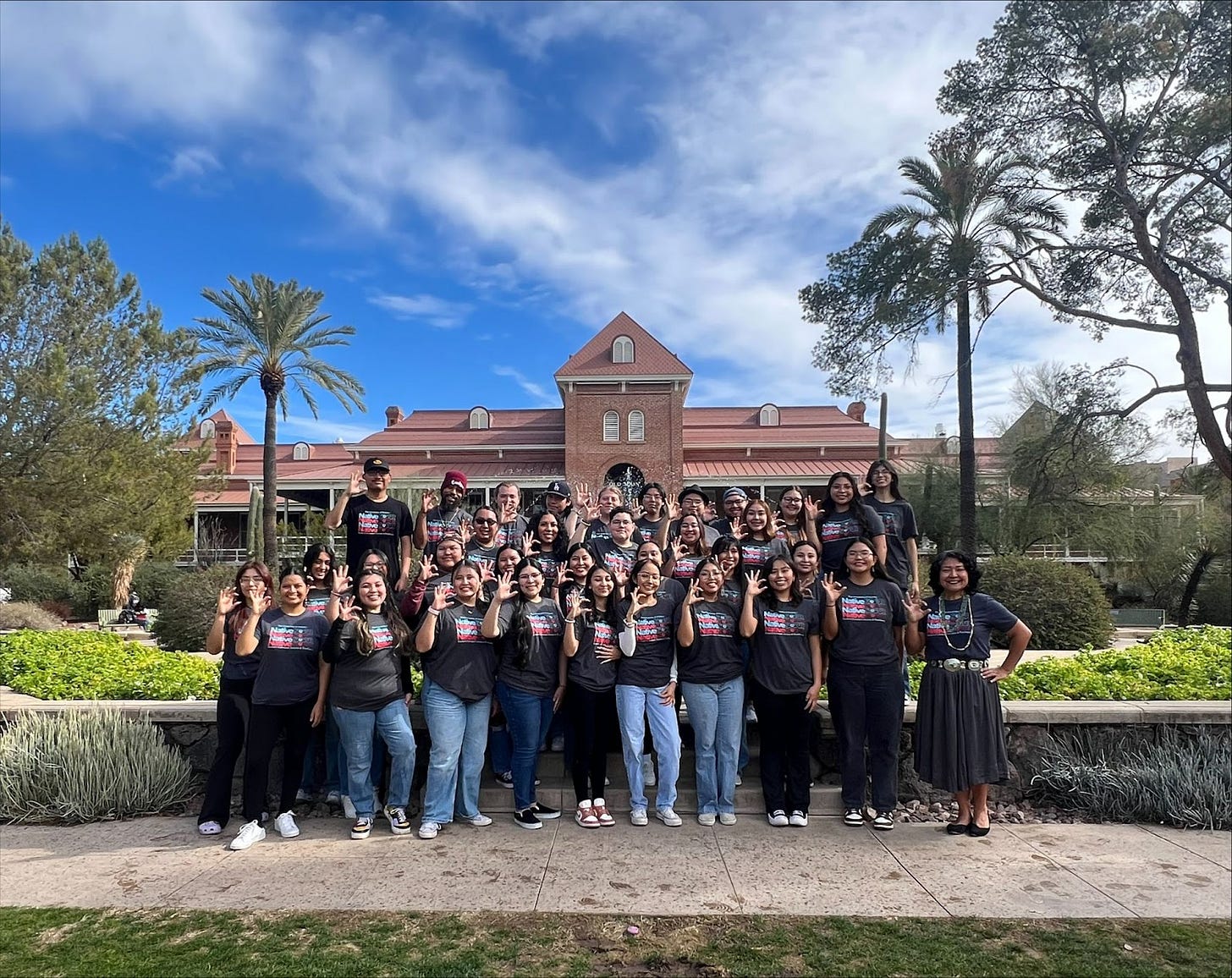The Daily Solution: Partnership helps support Indigenous students
Sunnyside formalized an agreement with the UA to provide mentoring to Indigenous students ... Thousands of kids benefitted from the Native SOAR program... UA cuts $30 million.
Sunnyside Unified School District is officially partnering with the University of Arizona to help center the needs of Indigenous students and provide them with the knowledge and support to pursue a college education.
The UA’s Native Student Outreach, Access and Resiliency, SOAR, program started in 2005 and teaches students the skills they need to confidently pursue higher education. The mentorship program walks students step-by-step through applying for colleges, scholarships and financial aid.
Since 2014, more than 6,900 elementary and high school students throughout the Southwest have benefitted from the program, most of them in Arizona. Prior to the pandemic, the program only served four schools in-person, but the shift to online programming opened it up to students from more than 140 schools.
Sunnyside’s Native American Education Program has been working with Native SOAR for several years, but last month, the district’s governing board approved an intergovernmental agreement with the UA to formalize the partnership.
The program is now available to all Native American and Alaskan Native students attending any of this district’s schools at no additional cost to the district’s students, families and educators.
In 2022, Native SOAR received a $1.2 million grant from the Arizona Department of Education that allowed for its expansion and integration into more Tucson schools, including Sunnyside. That same year, it was recognized by Michelle Obama’s Reach Higher Initiative.
The program provides elementary and high school students with mentors who are current undergraduate students of UA. Mentors enroll in a three-credit course and spend an hour each week for 10-12 weeks with their mentees. They’re also paid for their work.
Native SOAR Outreach Coordinator Kayleigh Paddock enjoyed the program so much that she took the course twice while attending the UA. After graduation, Paddock returned to the program again with hopes of helping mentees alleviate the stresses of college planning.
“I was able to share my story, make connections with my other classmates, and just essentially be a part of a community,” said Paddock. ”I met some of my best friends, I'm still in touch with through Native SOAR.”
The course is offered in the fall and spring semesters, allowing for support throughout the academic year. Mentors from any background are encouraged to join regardless of their major. Since 2014, more than 250 undergraduate students have served as mentors.
The mentor-mentee pairings will primarily meet in the SUSD library, with additional opportunities for Sunnyside students to visit the UA campus. Transportation will be provided by Native SOAR.
Felisia Tagaban Gaskin, director of Native SOAR and a doctoral student at the UA College of Education’s Center for the Study of Higher Education in the College of Education, has been involved in the program since 2017.
“A lot of the students have a desire to give back to the community in the form of not only mentorship but also leadership. Many of them are pursuing service-oriented careers, whether it's pre-nursing, pre-med, social work, future teachers, or future educators,” said Tagaban Gaskin. “The students that come to us are already interested in being there to serve the community and also to serve the youth.”
The program also supports students who want to attend one of the state’s three tribal colleges and universities.
“While they can get their associates at those institutions, sometimes that's where their pathway ends,” said Tagaban Gaskin. “They go right into the community, and they become community knowledge holders, or they start serving in a tribal government position or elsewhere within their own tribal identity.”
With its partnership with Sunnyside solidified, organizers are hopeful that Native SOAR will continue to cultivate pathways for district students.
“It’s a great step towards what we hope is a sustainable and long-standing relationship in the years ahead,” said Tagaban Gaskin.
Making cuts: The University of Arizona plans to save $27 million by eliminating vacant positions in academic units, Arizona Public Media’s Paola Rodriguez reports. The specific positions haven’t been made public yet. The UA will save another $3 million by cutting the eSports program and suspending some grant programs, among other cuts. The UA is facing a $177 budget deficit and the Arizona Board of Regents sent the plan to Gov. Katie Hobbs on Friday after she blasted them for how they’re handling the crisis.
Pantry getting bare: UA students used the campus pantry at record-breaking levels last semester, leading to cutbacks in food and hygiene products offered to students in need this semester, the Arizona Daily Star’s Ellie Wolfe reports. More than 3,800 students used the pantry in the fall semester, an increase that pantry staff said was partly due to better marketing and the diminished social stigma of using the pantry. The cutbacks are not related to the UA’s financial crisis, university officials said.
Let’s start with “I feel” statements: Tucson City Manager Mike Ortega says the city should rethink RTA Next, Tucson Sentinel columnist Blake Morlock writes. Ortega wrote a memo to the city council on Friday saying he might not be able to recommend “in good conscience” that the city participate in RTA Next without the city getting a share of the funding pie that matches the city’s sales tax contribution. In effect, the city would get shortchanged $640 million over the next 20 years. Ortega wants the city to sit down with the other jurisdictions in what Morlock describes as marriage counseling.
City-living bobcats: Local retired scientists will keep studying bobcats in Tucson, thanks to a state grant being extended another year, AZPM’s Tony Paniagua reports. Since the Bobcats in Tucson Research Project began in 2020 with a grant from the Arizona Game and Fish Department’s Heritage Fund, more than 50,000 sightings of bobcats were reported in the Tucson area west of Interstate 10. Researchers tag bobcats and monitor their behavior so they can understand how bobcats interact with an urban environment, as well as help residents bobcat-proof their property, such as building better chicken coops.
Fix in the works: The owners of two apartment complexes struck a deal with South Tucson officials in court after the city sued over crime at the properties, KOLD’s Andres Rendon reports. Each of the complexes, Spanish Trail Apartments and 6th Avenue Suites, saw more than 800 calls to police last year. Under the agreement, the property owners will install fencing, hire security guards, remove junk vehicles, make sure maintenance employees are available, and other measures.
Zoning politics: In a break from strict partisan politics, state lawmakers from both parties are trying to come up with a way to pump up the state’s housing supply, Capitol Media Services’ Bob Christie reports. Their main target is city zoning laws, which developers unsuccessfully tried to dismantle last year. A big part of the current effort is prohibiting cities from requiring minimum lot sizes or rules on how close together homes can be built. Another strategy in the works is to allow developers to convert any commercial property, such as a strip mall, to homes or apartments.
48: The high temperature on Saturday in Tucson, making it the second-coldest Feb. 10 on record.











